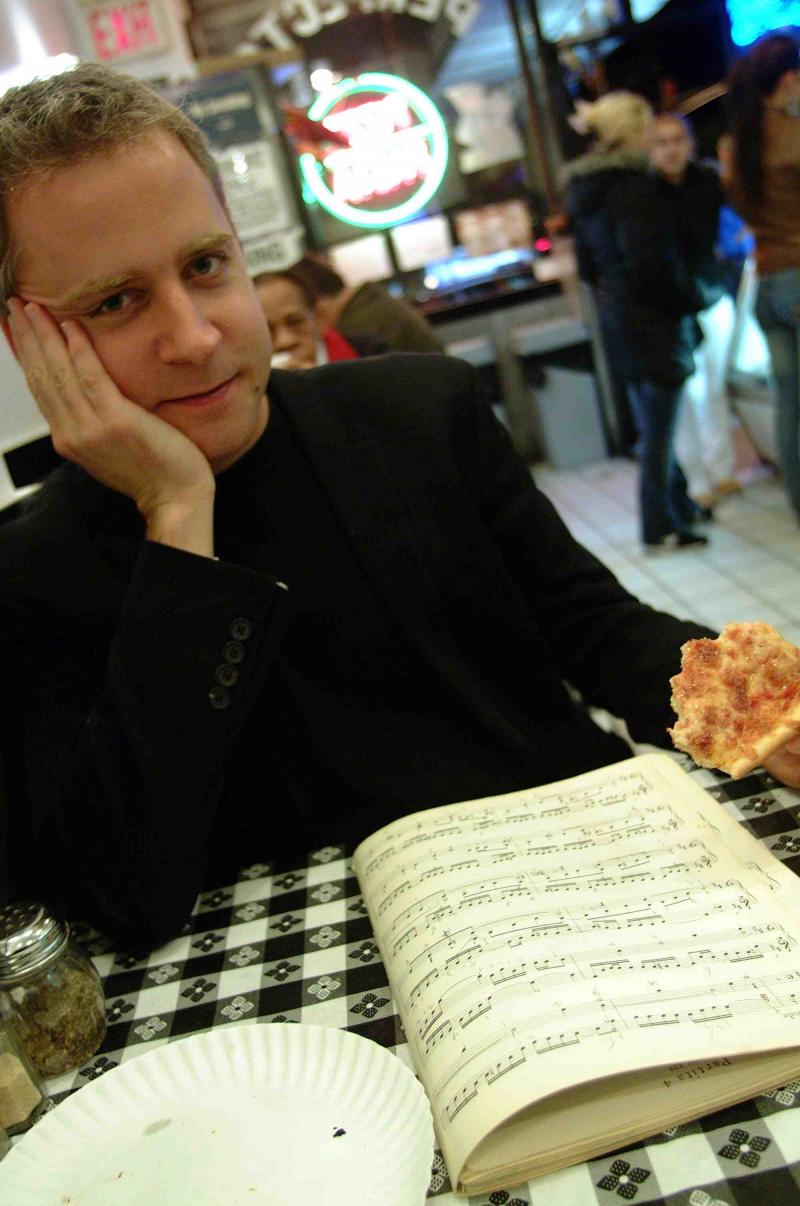Classical CDs Weekly: Beethoven, Ligeti, Ravi Shankar, Vivaldi | reviews, news & interviews
Classical CDs Weekly: Beethoven, Ligeti, Ravi Shankar, Vivaldi
Classical CDs Weekly: Beethoven, Ligeti, Ravi Shankar, Vivaldi
Piano classics old and new, a symphony by an Indian legend and a young Italian soprano's Vivaldi recital

 Beethoven: Sonata no 32, Ligeti Études Books 1 and 2 Jeremy Denk (Nonesuch)
Beethoven: Sonata no 32, Ligeti Études Books 1 and 2 Jeremy Denk (Nonesuch)
The word Études conjures negative associations for musicians. They’re studies. Which suggests endless practice. As New York-based Jeremy Denk says in his notes, they’re pieces which can crush a child’s enthusiasm for music. “You can imagine zoning out, lulled by the drudgery, modulating up and down until you fell off the keyboard.” Eccentric Hungarian modernist György Ligeti composed 18 Études for piano in three volumes, and they’re all great. Your ears are twisted, challenged but always entertained. And the poor pianist’s technique is stretched in superhuman ways. Denk finds the right sense of “joyful, delirious madness” in these pieces as well as illuminating their musical qualities. These Études are demanding in the extreme, their occasional violence abruptly melting into black humour, cool jazz and calm lyricism.
Cordes à vide begins as a spare study in open fifths, gently thickening in texture. Arc-en-ciel ‘s Bill Evans tribute is elegant and understated: Ligeti always trusts the listener and never makes his points crudely. These two Études are among the gentlest, but it’s the nuttier, crazier pieces which have gripped me most: Der Zauberlehrling, the thunderous left hand of Entrelacs and the haunting, shimmering Automne à Varsovie with its brutal close. Denk gives us Beethoven’s final piano sonata as a coupling, its compressed two movement structure still radical and surprising. His performance is imposing in the extreme, emphasising the craggy, unwieldy elements. The sleeve notes are erudite and witty. A stunning recital.
Watch Jeremy Denk discuss Ligeti:
 Ravi Shankar: Symphony Anoushka Shankar (sitar), London Philharmonic Orchestra/David Murphy (LPO)
Ravi Shankar: Symphony Anoushka Shankar (sitar), London Philharmonic Orchestra/David Murphy (LPO)
Sitar player and composer Ravi Shankar was born as far back as 1920. The list of people who he’s encountered and collaborated with during his career is daunting. Casals, Toscanini and Menuhin are among the names that feature. Shankar became a global star in the 1960s when he met the Beatles and became a profound influence on George Harrison’s subsequent career. He’s probably the one Indian musician to achieve global stardom. And Philip Glass cites Shankar as the greatest influence on minimalism, opening his eyes to “music in which the rhythmic structure became the controlling function”, rather than conventional Western harmony. For Glass, Shankar “almost single-handedly altered the course of contemporary music in its broadest sense.” Heady, well-deserved praise.
Sadly, this four-movement symphony with sitar obbligato doesn’t live up to expectations. As an extended suite of colourful orchestral pieces it’s everything you’d hope – well-scored, ripely harmonised in places. It’s hard, though, not to see the marriage of two totally different styles as a doomed one – I can’t convince myself that Western classical instruments and players can inhabit an Indian classical style. What we get are some intriguing, though unsubtle, attempts to mimic different ragas and rhythmic patterns. The LPO players gamely keep up, even chanting and clapping near the last movement’s brilliant close. But the only glimpses of authenticity come during the extended passages for sitar, wonderfully played here by Shankar’s daughter Anoushka. These are well-integrated into the symphony’s structure, but they don’t happen often enough. David Murphy, who helped Shankar with the work’s scoring and notation, conducts with energy. The recorded sound is clear and detailed. But the end result can’t help falling between too many stools.
 Vivaldi: Opera Arias Roberta Invernizzi (soprano), La Risonanza/Fabio Bonizzoni (Glossa)
Vivaldi: Opera Arias Roberta Invernizzi (soprano), La Risonanza/Fabio Bonizzoni (Glossa)
Those thinking that Vivaldi’s music is all a bit, er, samey will have their preconceptions dashed by this recital disc. The surprises aren’t harmonic ones; what dazzles is the infectious bounce and the lightning changes of mood. Plus, the singing is spectacular. Roberta Invernizza’s voice can be so many things – subtle, soft, veiled when she chooses, and powerful enough to make the hairs on the back of your neck stand up when she’s at full-throttle. There’s never any hint of iciness, of bravura for its own sake. Nothing grates. The slight, unobtrusive vibrato is enough to give Invernizzi’s voice a touch of fallible humanity. Plus, you can tell that she’s approaching each of the 14 arias individually – as an Italian, the texts mean something to her.
There’s plenty of panache and humour in the delivery– Invernizza goes over the top several times, but you smile as she does so. As with the aria from Ottone which closes the disc, with its somersaulting vocal line delivered with an agility which defies belief. The flamboyant arias are all showstoppers; one from Dorilla in Tempe is typically enjoyable, Invernizzi’s lightning delivery matched by Fabio Bonizzoni’s sizzling accompaniments, with baroque guitar adding plenty of rhythmic kick. Marvel at the natural trumpet solo which opens Combatta un gentil cor, and at the crisp string semiquavers which propel several of the faster arias. Totally compelling. The packaging and documentation are stylish too.
Explore topics
Share this article
The future of Arts Journalism
You can stop theartsdesk.com closing!
We urgently need financing to survive. Our fundraising drive has thus far raised £49,000 but we need to reach £100,000 or we will be forced to close. Please contribute here: https://gofund.me/c3f6033d
And if you can forward this information to anyone who might assist, we’d be grateful.

Subscribe to theartsdesk.com
Thank you for continuing to read our work on theartsdesk.com. For unlimited access to every article in its entirety, including our archive of more than 15,000 pieces, we're asking for £5 per month or £40 per year. We feel it's a very good deal, and hope you do too.
To take a subscription now simply click here.
And if you're looking for that extra gift for a friend or family member, why not treat them to a theartsdesk.com gift subscription?
more Classical music
 Dunedin Consort, Butt / D’Angelo, Muñoz, Edinburgh International Festival 2025 review - tedious Handel, directionless song recital
Ho-hum 'comic' cantata, and a song recital needing more than a beautiful voice
Dunedin Consort, Butt / D’Angelo, Muñoz, Edinburgh International Festival 2025 review - tedious Handel, directionless song recital
Ho-hum 'comic' cantata, and a song recital needing more than a beautiful voice
 Classical CDs: Dungeons, microtones and psychic distress
This year's big anniversary celebrated with a pair of boxes, plus clarinets, pianos and sacred music
Classical CDs: Dungeons, microtones and psychic distress
This year's big anniversary celebrated with a pair of boxes, plus clarinets, pianos and sacred music
 BBC Proms: Liu, Philharmonia, Rouvali review - fine-tuned Tchaikovsky epic
Sounds perfectly finessed in a colourful cornucopia
BBC Proms: Liu, Philharmonia, Rouvali review - fine-tuned Tchaikovsky epic
Sounds perfectly finessed in a colourful cornucopia
 BBC Proms: Suor Angelica, LSO, Pappano review - earthly passion, heavenly grief
A Sister to remember blesses Puccini's convent tragedy
BBC Proms: Suor Angelica, LSO, Pappano review - earthly passion, heavenly grief
A Sister to remember blesses Puccini's convent tragedy
 BBC Proms: A Mass of Life, BBCSO, Elder review - a subtle guide to Delius's Nietzschean masterpiece
Mark Elder held back from blasting the audience with a wall of sound
BBC Proms: A Mass of Life, BBCSO, Elder review - a subtle guide to Delius's Nietzschean masterpiece
Mark Elder held back from blasting the audience with a wall of sound
 BBC Proms: Le Concert Spirituel, Niquet review - super-sized polyphonic rarities
Monumental works don't quite make for monumental sounds in the Royal Albert Hall
BBC Proms: Le Concert Spirituel, Niquet review - super-sized polyphonic rarities
Monumental works don't quite make for monumental sounds in the Royal Albert Hall
 Frang, Romaniw, Liverman, LSO, Pappano, Edinburgh International Festival 2025 review - sunlight, salt spray, Sea Symphony
Full force of the midday sea in the Usher Hall, thanks to the best captain at the helm
Frang, Romaniw, Liverman, LSO, Pappano, Edinburgh International Festival 2025 review - sunlight, salt spray, Sea Symphony
Full force of the midday sea in the Usher Hall, thanks to the best captain at the helm
 Elschenbroich, Grynyuk / Fibonacci Quartet, Edinburgh International Festival 2025 review - mahogany Brahms and explosive Janáček
String partnerships demonstrate brilliant listening as well as first rate playing
Elschenbroich, Grynyuk / Fibonacci Quartet, Edinburgh International Festival 2025 review - mahogany Brahms and explosive Janáček
String partnerships demonstrate brilliant listening as well as first rate playing
 BBC Proms: Akhmetshina, LPO, Gardner review - liquid luxuries
First-class service on an ocean-going programme
BBC Proms: Akhmetshina, LPO, Gardner review - liquid luxuries
First-class service on an ocean-going programme
 Budapest Festival Orchestra, Iván Fischer, Edinburgh International Festival 2025 review - mania and menuets
The Hungarians bring dance music to Edinburgh, but Fischer’s pastiche falls flat
Budapest Festival Orchestra, Iván Fischer, Edinburgh International Festival 2025 review - mania and menuets
The Hungarians bring dance music to Edinburgh, but Fischer’s pastiche falls flat
 Classical CDs: Hamlet, harps and haiku
Epic romantic symphonies, unaccompanied choral music and a bold string quartet's response to rising sea levels
Classical CDs: Hamlet, harps and haiku
Epic romantic symphonies, unaccompanied choral music and a bold string quartet's response to rising sea levels

Add comment